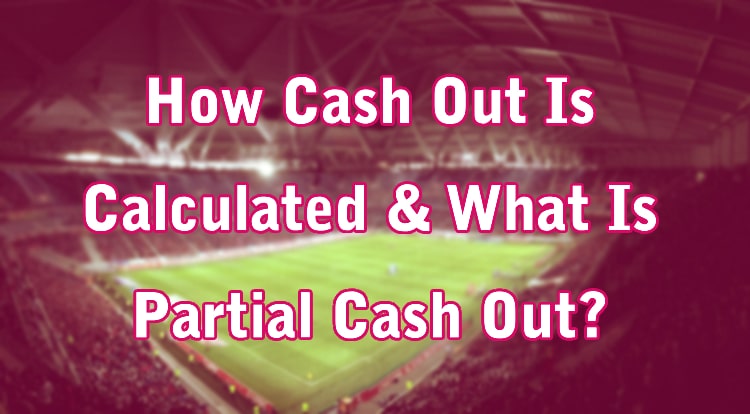
In the exhilarating universe of sports wagering, the concept of 'Cash Out' and 'Partial Cash Out' has gained significant traction. These features enable bettors to withdraw a portion or their entire stake before the conclusion of the event. Here at Money Reels casino, we delve into the intricacies of these features, providing a comprehensive understanding of how they are calculated and their implications on betting strategies.
Cash Out Meaning In Betting
In the realm of betting, "cash out" offers you the flexibility to settle your bet before the event you've wagered on concludes. This feature allows you to secure a portion of your potential winnings or minimise losses based on the current status of your bet. The bookies can offer cash out options part-way through the event, offering revised odds for an early withdrawal.
For example, if your team is winning but you're worried they might not hold the lead, cashing out gives you a chance to receive a confirmed profit or reduce a potential loss depending on the cash out offer.
This tool adds a strategic layer to betting, letting you react to live game dynamics or safeguard your stakes against unforeseen outcomes.
How Cash Out Is Calculated
Cash out calculation in sports betting hinges on three primary factors: your original stake, the original odds of your bet, and the current (live) odds of the event. The higher your chances of potentially winning, the higher the cash out offer and vice versa.
Here's a simplified formula to understand how cash out is calculated:
Cash Out Value = {(Original Odds / Live Odds) x Stake} - Stake
For instance, if you place a bet of £100 on a team with odds of 3:1, and during the match, the bookies offer a cash out option at 2:1 odds, your cash out value is calculated as follows:
Cash Out Value = {(3 / 2) x 100} - 100 = £50
This implies that if you were to cash out at this point, you would receive £50.
Is It Worth Cashing Out?
Deciding whether to cash out in betting boils down to your judgment about the ongoing event and the bookmaker's offer. If the game's momentum shifts and your bet's success seems uncertain, cashing out can be a strategic move to limit potential losses.
Similarly, if the bookie's cash out proposal appears attractive and you doubt the event will conclude to your advantage, accepting the offer might be wise. It usually means settling for a smaller profit, but it can be a secure way to ensure you don't walk away empty-handed.
Essentially, cashing out is about balancing optimism with realism. If you believe the tide is turning against your bet, cashing out can sometimes offer a safety net, allowing you to salvage some value from your wager before the outcome is finalised. It's a tool for managing risk, tailored to cautious players who prefer to lock in gains or minimise losses based on the unfolding action.
How Does a Partial Cash Out Work?
Partial cash out is a flexible feature that lets you take a portion of your winnings early while leaving a part of your bet active. Imagine you've placed a bet, and it's doing well, but you're not fully confident it will win.
With partial cash out, you can secure some profit or reduce potential losses by cashing out a fraction of your stake. The remaining portion continues to ride on the original bet, offering you a chance to win in the event your prediction holds true.
It's essentially an option to adjust the original bet by partially withdrawing.
Partial Cash Out Example
Let's say you bet £10 on a football match with potential winnings of £20. Halfway through, your team is leading, but you're now unsure about the outcome. The bookie offers a cash out of £15. You decide to partially cash out half your bet. This means you take £7.50 (half of the £15 offer) and leave the other £5 (half of your original bet) active.
If your team wins, you'll still earn a portion of the winnings on top of the £7.50 you've already secured. If they lose, you've minimised your loss, having already taken out £7.50.
Is Partial Cash Out Worth It?
Whether partial cash out is worth it depends on your perspective and betting strategy. This option can be beneficial if, during the event, you become less confident in the outcome you initially bet on but still want to bet on that outcome.
It offers a way to secure some profit or lessen potential losses by cashing out a portion of your bet. For instance, if the game's direction starts to waver, taking a partial cash out ensures you don't lose everything if the final result isn't in your favour.
However, there's a trade-off. If the event ends positively according to your original bet, you won't win as much as you could have without cashing out part of your stake.
Essentially, partial cash out is a balancing act between safeguarding your investment and gambling for a full payout, tailored to those who wish to manage their risk with more control during unfolding events.
Conclusion
In summary, cashing out in betting offers a way to potentially secure some winnings or minimise losses before an event concludes. It's a strategic decision that depends on your confidence in the bet's outcome and the bookmaker's offer. Partial cash out allows you to withdraw a portion of your potential winnings while keeping part of your stake active, blending security with the chance to win more.
Whether you choose to cash out or not is a personal decision influenced by your assessment of the event's likely outcome and your assessment of risk vs reward. It's about finding the right balance between caution and ambition.
In any case, when gambling, it is crucial to always gamble responsibly and play within your means. Winning is never guaranteed, so only bet money you are comfortable losing.
